新概念英语第三册第13课
新概念英语3第13课
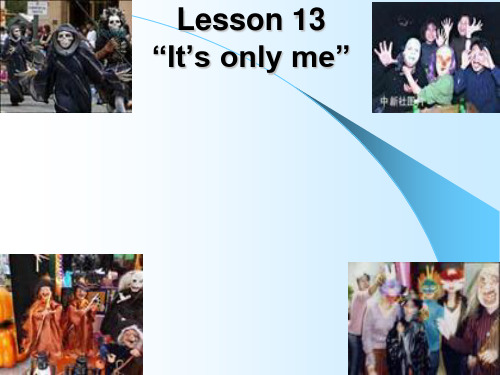
II New words & Expressions
II New words & Expressions
comfortable adj. 舒适的,舒服的 反义词:uncomfortable comfort n. 舒适 adj. 安慰 take comfort in be of good comfort放心,振作起來 cold comfort不起作用的安慰 comfort station公共厕所 discomfort n. 不舒适,不安,不方便,苦恼
Lesson 13 “It’s only me”
I Warm up
Do you think these pictures are beautiful?
Are they frightening?
What kind of party may this be?
(The fancy-dress party.)
Correct grammar and sentence structure do not in themselves constitute good writing. 正确的语法和句子结构本身并不能构成一篇好文章。
II New words & Expressions
effective adj. (usu of things, sometimes of people) Having an intended or expected effect; Operative; in effect (多指 物,偶尔指人)有效的,具有预期或先见效果的; 有效的实施 中;生效的 eg. The law is effective immediately. 这项法律立即生效。 an effective method 有效方法 take effective measures 采取有效措施
新概念英语第三册-Lesson13

Text
• 2、She was too excited to do any housework that morning, for in the evening she would be going to a fancy-dress party with her husband. • 1> too ... to… 太...而不能… • (不定式to 在大部分情况下表示否定概念)
Text
– be impatient to do sth – 急于要做某事, 迫不及待做某事 – impatient 可以换为eager, anxious, hungry, thirsty, desperate, can't wait(口语) – desperate(adj.不顾一切的, 拚死的) – she was impatient to try it on. – (try on 试穿)
The committee consists of 10 members. (committee n.委员会) = Ten members constitute the committee.
consist
Text
• CET-4 C • There has been a collision ______ a number of cars on the main road to town. A composing B consisting C involving D engaging
Words and Expressions
★ consist [kən’sɪst] v.由…组成 ★1) consist of... 由...组成 (表示被动概念) ★2) be made up of… 由...组成
新概念英语综合版第三册NCE3 Lesson13(共7个样品课件)

Enjoy your stay here
Arenas
Lesson 13 It's only me
● New words and expressions
● costume (n) 化妆服 ▲ a costume play / science fiction film ▲ dress / overalls / gown / uniform / pajamas / habit / garment ● consist (vi) 由……组成 ▲ consist of 由……组成(无被动)
Lesson 13 ‘It's only me’
• What did the man expect to find under the stairs?
• After her husband had gone to work,
• Mrs. Richards sent her children to school and went upstairs to her bedroom.
(Global Times)
▲ chunk 推荐 :effective and efficient
▲ Take effective and efficient measures to do 采取 有效措施……
▲ We must take effective and efficient measures to control the growth of population because China is still likely to be the first country to grow old before it gets rich. We must find ways and means to solve this problem.
新概念英语第三册第13课课堂笔记及答案.
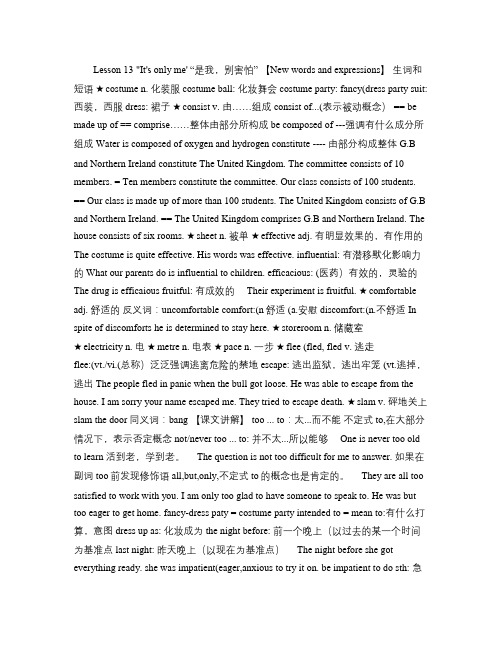
Lesson 13 "It's only me' “是我,别害怕” 【New words and expressions】生词和短语★costume n. 化装服 costume ball: 化妆舞会 costume party: fancy(dress party suit: 西装,西服 dress: 裙子★consist v. 由……组成 consist of...(表示被动概念) == be made up of == comprise……整体由部分所构成 be composed of ---强调有什么成分所组成 Water is composed of oxygen and hydrogen constitute ---- 由部分构成整体 G.B and Northern Ireland constitute The United Kingdom. The committee consists of 10 members. = Ten members constitute the committee. Our class consists of 100 students. == Our class is made up of more than 100 students. The United Kingdom consists of G.B and Northern Ireland. == The United Kingdom comprises G.B and Northern Ireland. The house consists of six rooms. ★sheet n. 被单★effective adj. 有明显效果的,有作用的The costume is quite effective. His words was effective. influential: 有潜移默化影响力的 What our parents do is influential to children. efficacious: (医药)有效的,灵验的The drug is efficaious fruitful: 有成效的Their experiment is fruitful. ★comfortable adj. 舒适的反义词:uncomfortable comfort:(n舒适 (a.安慰 discomfort:(n.不舒适 In spite of discomforts he is determined to stay here. ★storeroom n. 储藏室★electricity n. 电★metre n. 电表★pace n. 一步★flee (fled, fled v. 逃走flee:(vt./vi.(总称)泛泛强调逃离危险的禁地 escape: 逃出监狱,逃出牢笼 (vt.逃掉,逃出 The people fled in panic when the bull got loose. He was able to escape from the house. I am sorry your name escaped me. They tried to escape death. ★slam v. 砰地关上slam the door 同义词:bang 【课文讲解】 too ... to:太...而不能不定式to,在大部分情况下,表示否定概念 not/never too ... to: 并不太...所以能够One is never too old to learn 活到老,学到老。
新概念英语第三册第13课课件
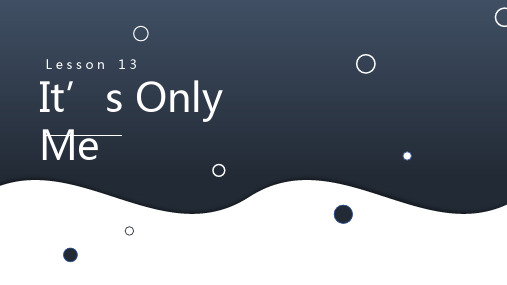
➢ comfort
n. • 舒适 • 安慰
v. • 安慰
discomfort n.不舒适
storeroom n.贮藏室
store n.商店 v.保存,贮藏
electricity n.电
停电了。 The electricity is off .
electronic adj.电子的,电子设备的 electronic music 电子音乐 electric adj.带电的 an electric guitar 电吉他
Text
After her husband had gone to work. Mrs. Richards sent her children
to school and went upstairs to her bedroom.She was too excited to
do any housework that morning,for in the evening she would be
to leave the bread on the kitchen table.
just as:正当
baker n.面包师
fail to do sth. 未能做某事
Text
现在分词做状语否定形式
hide v.隐藏
Not wanting to frighten the poor man, Mrs. Richards quickly hid in
Lesson 13
It’s Only Me
1
New Words
costume n.戏服,化装服
the clothes worn by people from a particular place or during a particular historical period
新概念英语第三册学习笔记第13课
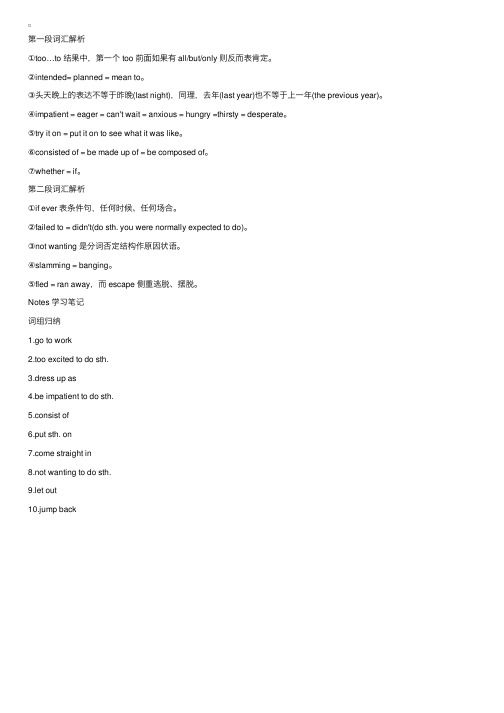
第⼀段词汇解析①too…to 结果中,第⼀个 too 前⾯如果有 all/but/only 则反⽽表肯定。
②intended= planned = mean to。
③头天晚上的表达不等于昨晚(last night),同理,去年(last year)也不等于上⼀年(the previous year)。
④impatient = eager = can't wait = anxious = hungry =thirsty = desperate。
⑤try it on = put it on to see what it was like。
⑥consisted of = be made up of = be composed of。
⑦whether = if。
第⼆段词汇解析①if ever 表条件句,任何时候、任何场合。
②failed to = didn't(do sth. you were normally expected to do)。
③not wanting 是分词否定结构作原因状语。
④slamming = banging。
⑤fled = ran away,⽽ escape 侧重逃脱、摆脱。
Notes 学习笔记词组归纳1.go to work2.too excited to do sth.3.dress up as4.be impatient to do sth.5.consist of6.put sth. one straight in8.not wanting to do sth.9.let out10.jump back。
新概念英语第三册第13课It's only me
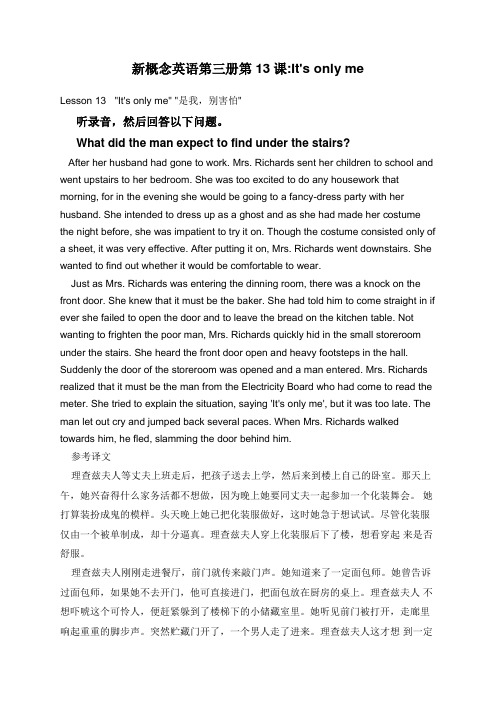
新概念英语第三册第13课:It's only meLesson 13 "It's only me" "是我,别害怕"听录音,然后回答以下问题。
What did the man expect to find under the stairs?After her husband had gone to work. Mrs. Richards sent her children to school and went upstairs to her bedroom. She was too excited to do any housework that morning, for in the evening she would be going to a fancy-dress party with her husband. She intended to dress up as a ghost and as she had made her costume the night before, she was impatient to try it on. Though the costume consisted only of a sheet, it was very effective. After putting it on, Mrs. Richards went downstairs. She wanted to find out whether it would be comfortable to wear.Just as Mrs. Richards was entering the dinning room, there was a knock on the front door. She knew that it must be the baker. She had told him to come straight in if ever she failed to open the door and to leave the bread on the kitchen table. Not wanting to frighten the poor man, Mrs. Richards quickly hid in the small storeroom under the stairs. She heard the front door open and heavy footsteps in the hall. Suddenly the door of the storeroom was opened and a man entered. Mrs. Richards realized that it must be the man from the Electricity Board who had come to read the meter. She tried to explain the situation, saying 'It's only me', but it was too late. The man let out cry and jumped back several paces. When Mrs. Richards walked towards him, he fled, slamming the door behind him.参考译文理查兹夫人等丈夫上班走后,把孩子送去上学,然后来到楼上自己的卧室。
新概念第三册 lesson 13 课件

eg. The car slammed into a truck. 那辆小轿车撞到了一辆卡车上。
Key to Key Structures B
1, I must go to the station to meet my mother now. I must be at the office by 8:00. John is still not coming. He must be in a traffic jam.
This new copy machine is more efficient than the old one.
这台新复印机比那台旧的效率高。
flee (fled fled) vt. vi. (1) 从…逃跑, 从困难或险境中逃跑
eg. The driver fled the scene of the accident. 司机从肇事地点逃跑了。
这种药治头痛有很好的疗效。
After the government had taken some effective measures, prices began to level off. 政府采取了一些有效措施后,物价开始稳定了。 an effective leader 一位得力领导
efficient adj. (指人)高效的, 能胜任的,有能力的 (尤指工具、机器、系统等)有效力的,功效大的, 产出与投入比值高的 eg. an efficient secretary 能干的秘书 an efficient manager 称职的经理
2, You mustn’t smoke in the office. You needn’t come if you have no time.
新概念英语第三册课文翻译lesson 13
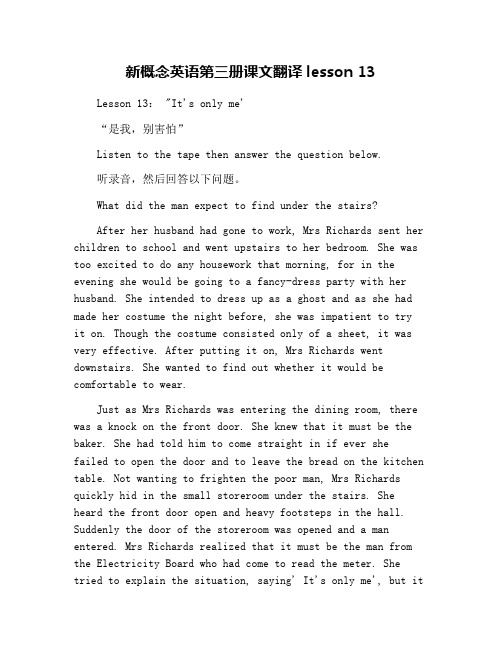
新概念英语第三册课文翻译lesson 13 Lesson 13: "It's only me'“是我,别害怕”Listen to the tape then answer the question below.听录音,然后回答以下问题。
What did the man expect to find under the stairs?After her husband had gone to work, Mrs Richards sent her children to school and went upstairs to her bedroom. She was too excited to do any housework that morning, for in the evening she would be going to a fancy-dress party with her husband. She intended to dress up as a ghost and as she had made her costume the night before, she was impatient to tryit on. Though the costume consisted only of a sheet, it was very effective. After putting it on, Mrs Richards went downstairs. She wanted to find out whether it would be comfortable to wear.Just as Mrs Richards was entering the dining room, there was a knock on the front door. She knew that it must be the baker. She had told him to come straight in if ever shefailed to open the door and to leave the bread on the kitchen table. Not wanting to frighten the poor man, Mrs Richards quickly hid in the small storeroom under the stairs. She heard the front door open and heavy footsteps in the hall. Suddenly the door of the storeroom was opened and a man entered. Mrs Richards realized that it must be the man from the Electricity Board who had come to read the meter. She tried to explain the situation, saying' It's only me', but itwas too late. The man let out a cry and jumped back several paces. When Mrs Richards walked towards him, he fled, slamming the door behind him.New words and expressions 生词与短语costumen. 化装服consistv. 由……组成sheetn. 被单effectiveadj. 有明显效果的,有作用的metern. 电表pacen. 一步flee (fled, fled)v. 逃走slamv. 砰地关上本文参考译文理查兹夫人等丈夫上班走后,把孩子送去上学,然后来到楼上自己的卧室。
新概念英语第三册逐句精讲第13课 It′s only me
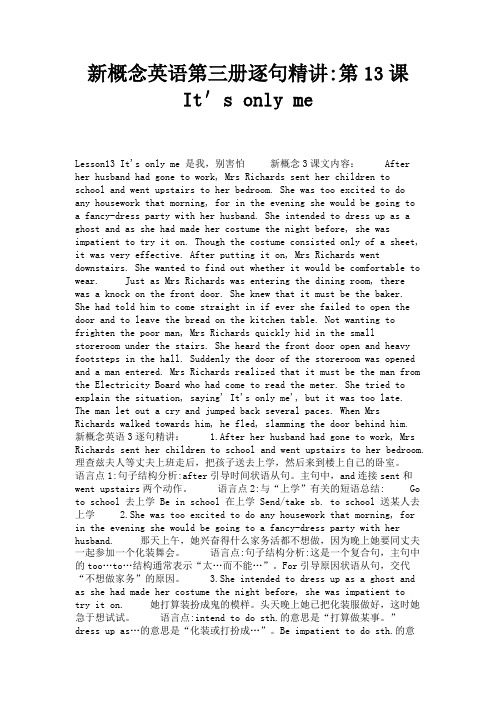
新概念英语第三册逐句精讲:第13课It′s only meLesson13 It's only me 是我,别害怕新概念3课文内容:Afterher husband had gone to work, Mrs Richards sent her children toschool and went upstairs to her bedroom. She was too excited to doany housework that morning, for in the evening she would be going toa fancy-dress party with her husband. She intended to dress up as a ghost and as she had made her costume the night before, she was impatient to try it on. Though the costume consisted only of a sheet,it was very effective. After putting it on, Mrs Richards went downstairs. She wanted to find out whether it would be comfortable to wear. Just as Mrs Richards was entering the dining room, therewas a knock on the front door. She knew that it must be the baker.She had told him to come straight in if ever she failed to open the door and to leave the bread on the kitchen table. Not wanting to frighten the poor man, Mrs Richards quickly hid in the smallstoreroom under the stairs. She heard the front door open and heavy footsteps in the hall. Suddenly the door of the storeroom was opened and a man entered. Mrs Richards realized that it must be the man from the Electricity Board who had come to read the meter. She tried to explain the situation, saying' It's only me', but it was too late.The man let out a cry and jumped back several paces. When MrsRichards walked towards him, he fled, slamming the door behind him.新概念英语3逐句精讲: 1.After her husband had gone to work, Mrs Richards sent her children to school and went upstairs to her bedroom. 理查兹夫人等丈夫上班走后,把孩子送去上学,然后来到楼上自己的卧室。
(英音版)新概念英语第三册第13课:The Greenwood Boys
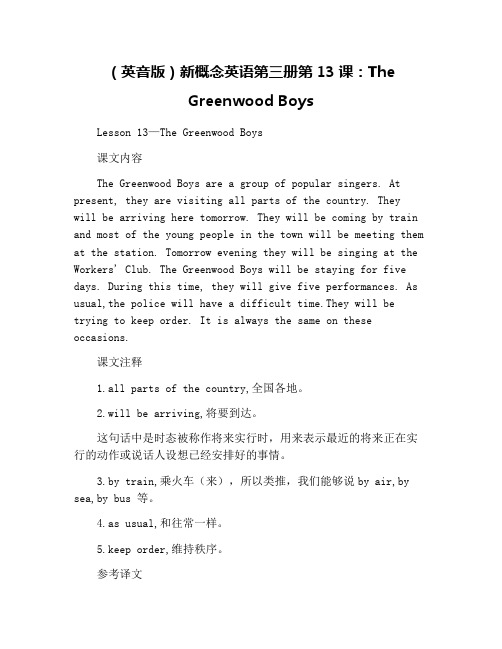
(英音版)新概念英语第三册第13课:TheGreenwood BoysLesson 13—The Greenwood Boys课文内容The Greenwood Boys are a group of popular singers. At present, they are visiting all parts of the country. Theywill be arriving here tomorrow. They will be coming by train and most of the young people in the town will be meeting them at the station. Tomorrow evening they will be singing at the Workers' Club. The Greenwood Boys will be staying for five days. During this time, they will give five performances. As usual,the police will have a difficult time.They will be trying to keep order. It is always the same on these occasions.课文注释1.all parts of the country,全国各地。
2.will be arriving,将要到达。
这句话中是时态被称作将来实行时,用来表示最近的将来正在实行的动作或说话人设想已经安排好的事情。
3.by train,乘火车(来),所以类推,我们能够说by air,by sea,by bus 等。
4.as usual,和往常一样。
5.keep order,维持秩序。
参考译文“绿色少年”是一个流行歌曲演唱团。
新概念英语第三册第13课-It's only me
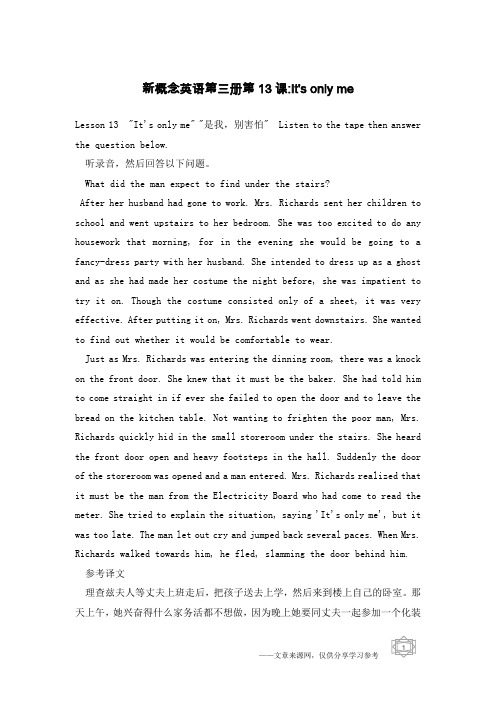
新概念英语第三册第13课:It's only meLesson 13 "It's only me" "是我,别害怕" Listen to the tape then answer the question below.听录音,然后回答以下问题。
What did the man expect to find under the stairs?After her husband had gone to work. Mrs. Richards sent her children to school and went upstairs to her bedroom. She was too excited to do any housework that morning, for in the evening she would be going to a fancy-dress party with her husband. She intended to dress up as a ghost and as she had made her costume the night before, she was impatient to try it on. Though the costume consisted only of a sheet, it was very effective. After putting it on, Mrs. Richards went downstairs. She wanted to find out whether it would be comfortable to wear.Just as Mrs. Richards was entering the dinning room, there was a knock on the front door. She knew that it must be the baker. She had told him to come straight in if ever she failed to open the door and to leave the bread on the kitchen table. Not wanting to frighten the poor man, Mrs. Richards quickly hid in the small storeroom under the stairs. She heard the front door open and heavy footsteps in the hall. Suddenly the door of the storeroom was opened and a man entered. Mrs. Richards realized that it must be the man from the Electricity Board who had come to read the meter. She tried to explain the situation, saying 'It's only me', but it was too late. The man let out cry and jumped back several paces. When Mrs. Richards walked towards him, he fled, slamming the door behind him. 参考译文理查兹夫人等丈夫上班走后,把孩子送去上学,然后来到楼上自己的卧室。
新概念英语第三册第13课习题答案及解析
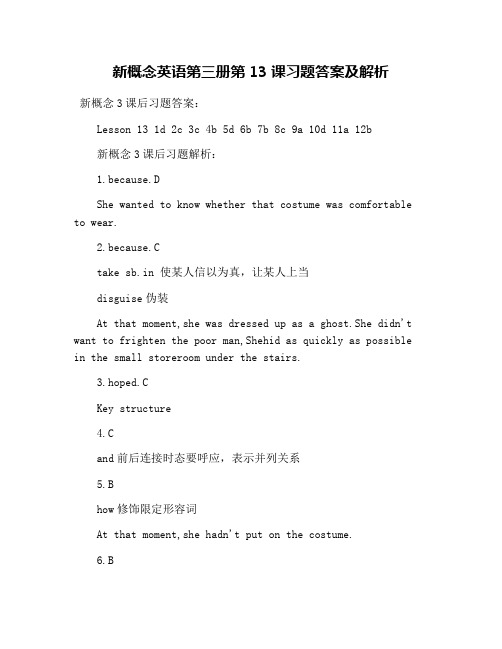
新概念英语第三册第13课习题答案及解析新概念3课后习题答案:Lesson 13 1d 2c 3c 4b 5d 6b 7b 8c 9a 10d 11a 12b新概念3课后习题解析:1.because.DShe wanted to know whether that costume was comfortable to wear.2.because.Ctake sb.in 使某人信以为真,让某人上当disguise伪装At that moment,she was dressed up as a ghost.She didn't want to frighten the poor man,Shehid as quickly as possible in the small storeroom under the stairs.3.hoped.CKey structure4.Cand前后连接时态要呼应,表示并列关系5.Bhow修饰限定形容词At that moment,she hadn't put on the costume.6.B.not wanting to frighten the poor man.动词不定式的否定形式是在动词不定式符号之前直接加否定词not,neveranxious形容词做原因状语7.B强调过去的一个动作8.Csee sb.do sth看见某人做某事做宾语补足语时,不定式符号to被省略9.Aat the very moment 就在此刻as long as/so long as 用来引导条件句,表示只要You can go out as long as you pormise to be back before 11 o'clockonly when 引导时间状语从句10.Dmiss+动名词,表示错过做什么事情I don't want to miss seeing that film on television tongightforgot to do sth表示忘记去做某事Yesterday ,I forgot to lock the door.succeed in doing sth.表示成功做了某事if..happen to.表示某事偶然发生If you happen to pass the baker's,pick me up a brown loaf,would you?If you happen to finish the work early give me a ring.11.Areading 表示仪表或者仪器上的指数、读数What are the temperature readings for the week?take a metre-reading 读电表上的数字measurement 测量尺寸、大小调节稳定What's your waist measurement?regulation 调节;regulation of body heat体温调节12.Blet out 发出;giveshout 高呼,高喊;有目的的shout to sb 对某人高声喊shout at sb.对某人大喊大叫。
新概念三13课
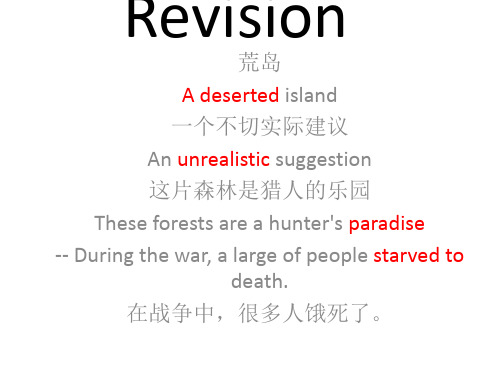
2> be made up of…由...组成
• 3> comprise v.包含, 由...组成(整体由部分所 构成)
• -- Our class consists of 100 students. • = Our class is made up of more than 100
students. • -- The United Kingdom consists of G.B and
window with a slam • ② slam on the brakes : 急刹车 • ③ grand slam : 大满贯 • ④ shut the door :闭门羹
• 及物动词 vt. 1. 想像,设想[+v-ing] Fancy sitting in the sun all day! 想一想整天坐在太阳底下的滋味吧! Fancy her saying a thing like that! 你能想像她竟说出那样的话来! 2.猜想[Y][+(that)] I fancy he's pretty happy. 我猜想他很幸福. 3. 喜爱,爱好;想要[+v-ing] What do you fancy for dinner? 你晚饭想吃什么? I don't fancy walking in the rain. 我不喜欢在雨中行走.
• intended to打算做什么 = mean to do意图做什么 • dress up as… 化妆成为… • the night before 前一个晚上(以过去的某一个时间为基准点) • last night 昨天晚上(以现在为基准点) • -- She went to New York on business three days ago,
新概念英语第三册第13课

Fancy meeting you guys here. FC Barcelona is a fancy one.
fancy man
2. … dress up as a ghost… (L5)
v.假扮 v.掩饰
3. She had told him to come straight in… (L10)
新版个人所得税已经生效了。
The video makes me comfortable.
Make yourself comfortable.
Be at home.
久违了, 词根…
琥珀
thermometer
the living pace
keep pace with
set the pace
If you want to play football well, you’ll learn to change paces.
Lesson 13 It’s only me
一课●simon
词汇:基础用法、一词多义、词根词缀…
fancy-dress party costume n. 化妆服
gown
overalls pyjamas/pajamas
costume play
角色扮演;动漫真人秀
求大神帮忙把我P的胖一点
女神TM终于答应我了, 求大神帮忙把合照P近一点哟
短语盘点 (L13)
化妆舞会
做她的戏服
包括
前门
任何时候
吓到这个可怜的人 供电局
追随某人的脚步 查电表
有效率的
他是一个固执的人。 别人的话对他没有任何效果。 他总是一只耳进一只耳出。
He is a stubborn guy. What other people said had no effect on him.
新概念英语第三册第13课NCE3_lesson13(共19页)

Page 6
▲ chunk 推荐 :effective and efficient
▲ Take effective and efficient measures to do 采取有效措施…… ▲ We must take effective and efficient measures to control the growth of population because China is still likely to be the first country to grow old before it gets rich. We must find ways and means to solve this problem.
Page 8
Page 9
▲ Live in comfort ▲ 试译:知足常乐
▲ One who is contented will always live in comfort. ▲ easeful / cozy
▲ 试译:像我这样的一个贫寒的人,或者只有在 北平能享受一点清福了。
Page 10
Page 7
● comfortable (adj)舒服的
▲ comfort (n)享受,安逸 ▲ material / mental comfort ▲ Stop being hypocritical. ▲ She declared that she would rather cry in a BMW than smile on the back of a boyfriend’s bicycle.
▲ Those who are as poor as me could only enjoy the easeful life in Peiping.
新概念英语3_Lesson 13

flee (fled fled) vt. vi. (1) to run away (from), as from trouble or danger: (从…)逃跑, 从困难或险境中逃跑 eg. The driver fled the scene of the accident. 司机从肇事地点逃跑了。 The enemy fled in disorder. 敌人溃逃了。 The prisoner fled from the prison into the night. 囚犯从监狱逃到茫茫黑夜中。 The cat fled from the dog. 猫从狗那里逃走了。 (2) To pass swiftly away; vanish 飞逝, 迅速消失;消亡, 消散 eg. Color fled from her cheeks. 红晕从她的双颊上消失了。
discomfort n. 不舒适, 不安, 不方便, vt.使……不舒服(不安), 使苦恼, 使不便 e.g. In spite of discomforts he is determined to stay here. she was discomforted by a bad cold.
5. fΒιβλιοθήκη ee2. comprise, compose, constitute
- 1、下载文档前请自行甄别文档内容的完整性,平台不提供额外的编辑、内容补充、找答案等附加服务。
- 2、"仅部分预览"的文档,不可在线预览部分如存在完整性等问题,可反馈申请退款(可完整预览的文档不适用该条件!)。
- 3、如文档侵犯您的权益,请联系客服反馈,我们会尽快为您处理(人工客服工作时间:9:00-18:30)。
fancy (Ⅱ)
2. [only before noun] (especially of small things尤指小物件) with a lot of decorations or bright colours精致的;有精美 装饰的;绚丽的,花哨的 e.g. 精美小商品 fancy goods 3. (sometimes disapproving) expensive or connected with an expensive way of life昂贵的,奢华的 e.g. 价格昂贵的豪华餐厅。 fancy restaurants with fancy prices fancy dress n.[u] (BrE) clothes that you wear, especially at parties, to make you appear to be a different character 化妆服;化装舞会服 fancy-dress party 化装舞会
Lesson 13 "It's only me”
Lecturer: Patience Wang
New words and expressions
Read the new words and expressions on page 62.
Listening
Listen to the tape once and then answer the questions below.
Listening comprehension
Choose the correct answers to the questions on page 64.
Lesson 13 "It's only me” (Ⅰ)
After her husband had gone to work. Mrs. Richards sent her children to school and went upstairs to her bedroom. She was too excited to do any housework that morning, for in the evening she would be going to a fancy-dress part with her husband. She intended to dress up as a ghost and as she had made her costume the night before, she was impatient to try it on. Though the costume consisted only of a sheet, it was very effective. After putting it on, Mrs. Richards went downstairs. She wanted to find out whether it would be comfortable to wear.
Lesson 13 "It's only me” (Ⅱ)
Just as Mrs. Richards was entering the dinning room, there was a knock on the front door. She knewold him to come straight in if ever she failed to open the door and to leave the bread on the kitchen table. Not wanting to frighten the poor man, Mrs. Richards quickly hid in the small storeroom under the stairs. She heard the front door open and heavy footsteps in the hall. Suddenly the door of the storeroom was opened and a man entered. Mrs. Richards realized that it must be the man from the Electricity Board who had come to read the meter. She tried to explain the situation, saying 'It's only me', but it was too late. The man let out cry and jumped back several paces. When Mrs. Richards walked towards him, he fled, slamming the door behind him.
intend (Ⅰ)
intend v. 1. to have a plan, result or purpose in your mind when you do sth 打 算;计划;想要 e.g. (1) 他昨天想来我家。 He intended to come to my house yesterday. (2) 他确实曾打算多待一段时间。 He had really intended staying longer. (3) 我不打算长期逗留。 I don’t intend staying long. (4) [vn that] 计划月底将开始生产。 It is intended that production will start at the end of the month. 2. [vn] ~sth (by sth) / sth (as sth) to plan that sth should have a particular meaning意指 e.g. (1) 你说此话什么意思? What do you intend by saying so? (2) 我并不认为他有什么恶意。 I don’t think he intended any harm.
1. How was Mrs. Richards dressed? 2. Where was she going when someone knocked at the door? 3. Whom did she think it was? 4. Where did she hide? 5. Who suddenly opened the storeroom door? 6. What did she say to him?
after
过去完成时态常同表示时间状语的从属连词after 一同使用, 如: e.g. 他把信全写完后干了些家务活。 After he’d written all her letters, she did some housework. 假如从句中先于主句谓语动词动作发生的那个动词动作很短 暂,常可用一般过去时来代替过去完成时态,如: e.g. 他把猫放出去后,它就跑开钻进了灌木丛。 After she put the cat out, it ran off into the bushes. 但是,当两个分句为同一主语时,更早发生的那个动作通常 用过去完成时态来表示。如: e.g. 他送走她后就锁上门,睡觉去了。 After he had seen her off, he locked the door and went to bed.
fancy (Ⅰ)
fancy v. (fancies, fancying, fancied, fancied) 1. (BrE) (informal) to want sth or want to do sth 想要,想做 e.g. (1) [vn] 她不喜欢黑夜回家这个主意。 She didn’t fancy (=did not like) the idea of going home in the dark. (2) [v-ing] 今晚你想不想出去? Do you fancy going out this evening? 2. [vn] ~yourself (BrE, informal, disapproving) to think that you are very popular, attractive or intelligent自负;自命不凡 e.g. 他和我聊起天来,我看得出他确实自以为了不起。 He started to chat to me and I could tell that he really fancied himself. n. [pl. –ies] 1. [c,u] something that you imagine; your imagination想象的事物;想象力 e.g. 青少年的幻想 teenage fancies 2. a feeling that you would like to have or to do sth想要,爱好 e.g. 她说想要一条狗,但这不过是一时心血来潮。 She said she wanted a dog but it was only a passing fancy. adj. (fancier, fanciest) 1. unusually complicated, often in an unnecessary way异常复杂的;过分复杂的 e.g. 他们给这个舞蹈增加了许多复杂的舞步。 They added a lot of fancy footwork to the dance. (footwork n. [u] (体育、舞蹈的)步法,脚步动作
intend (Ⅱ)
intended [in’tendid] adj. (only before noun) 1. that you are trying to achieve or reach意欲达到的;打算的;计划的 e.g. 原来的目的 the intended purpose 2. ~for sb. / sth /~as sth./ to be / do sth planned or designed for sb. /sth为~打算(或设计) 的 e.g. 这本书是为儿童写的。 The book is intended for children. intention n. [c;u] ~(of doing sth) / ~(to do sth) ~(that…) what you intend or plan to do; your aim打算;计划;意图;目的 e.g. (1) 我无意去参加婚礼。 I have no intention of going to the wedding. (2) 我一心想把我欠她的还给她。 I have every intention of paying her back what I owe her. intentional adj. done deliberately; intended故意的;有意的;存心的 e.g. 很抱歉没把你列在名单里。——我不是有意的。 I’m sorry I left you off the list---it wasn’t intentional. adv. intentionally
